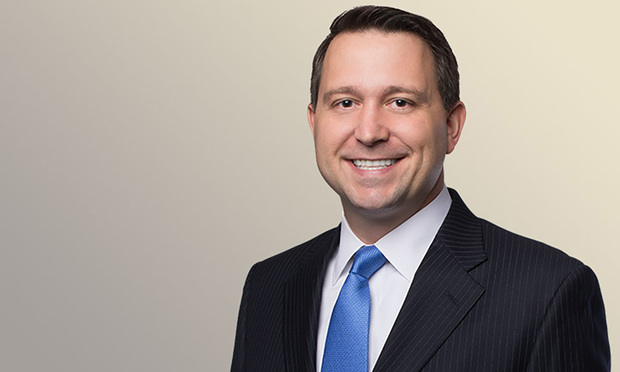King & Spalding Nets $15M for Bankrupt Chinese Company in Breach of Contract Trial
A Marietta company that markets gas grills and heaters must pay $15 million to the creditors of a bankrupt Chinese subsidiary over claims for products that were shipped but never paid for.
February 07, 2020 at 03:47 PM
5 minute read
 King & Spalding partner Thad Wilson. (Courtesy photo)
King & Spalding partner Thad Wilson. (Courtesy photo)
A federal jury in Atlanta agreed a Marietta company that markets grills, heaters and gas logs owes $5 million to a now-bankrupt Chinese company for products it manufactured and shipped, but that the local company never paid for.
The verdict came on top of an earlier summary judgment order granting the Chinese bankruptcy trustees $10 million due to a promissory note, netting a total of $15 million for the plaintiffs by a group of King & Spalding lawyers handling the complex litigation.
Although there were issues of applicable Chinese bankruptcy law involved, K&S partner Thad Wilson said none of the issues were before the jury.
"The law wasn't really in contest here. This was really a breach of contract case," said Wilson, whose team was led by partner W. Ray Persons and included Mark Maloney, Jon Jordan and Nadia Saleem.
Nonetheless, said Wilson, the case "was certainly unique because it was the first time a Chinese bankruptcy administrator filed and succeeded in a lawsuit in the United States to recover assets."
The defendant, Sure Heat Manufacturing, is represented by Schreeder, Wheeler & Flint partners John Christy and Debra Wilson. They did not respond to queries Friday.
According to Thad Wilson and court filings, the case is rooted in a 2004 decision by Sure Heat majority owner and president Michael Mulberry to set up a Chinese subsidiary, Sure Heat China (Suzhou), to manufacture gas-fired barbecue grills, heaters and fireplace products to be marketed in the U.S.
In 2009 and 2010, the Chinese company supplied and invoiced more than $20 million worth of goods to the Georgia company but was never paid for them.
The Chinese company filed for bankruptcy in 2014, and plaintiff Suzhou Allpro Certified Public Accountants Co. was appointed bankruptcy trustee.
The trustees sent a letter to Sure Heat that year demanding more than $20.8 million. Its complaint, filed in the U.S. District Court for the Northern District of Georgia in 2015, said the U.S. company never responded.
The complaint leveled multiple claims, including breach of contract, unjust enrichment, fraud, conversion and civil conspiracy, among others, and named Sure Heat, Mulberry and two other corporate officers as defendants.
Judge Richard Story ultimately dismissed all claims against the individual defendants, and ruled that more than $5 million of the purported debt was barred by the statute of limitations.
But, ruling on summary judgment, Story also said the evidence showed Sure Heat had signed an enforceable promissory note for $10 million.
The remaining $5 million was not so easily disposed of, and a jury issue remained as to whether it was owed, Story said, allowing only a breach of contract claim to proceed on that count.
Wilson said his team was concerned by the possibility that fraught relations between the U.S. and China, fanned by President Donald Trump's comments and trade sanctions, could influence a jury: A motion in limine they filed in October said the defense, throughout the litigation, "have painted the actions of Chinese citizens, who are not parties to this case but share the same nationality and race as plaintiff's employees, in a defamatory light."
Among their complaints were statements by Mulberry referring to "rioting" Chinese employees, and indications that Sure Heat's counsel "have embraced Mulberry's anti-Chinese rhetoric as part of their litigation strategy."
The motion asked Story to exclude any evidence or argument of "illegal or violent behavior surrounding the closure" of the Chinese factory, but Story denied it because such evidence "could be admissible under certain circumstances," and said he would "address these issues as they arise at trial."
According to defense filings, the Chinese company over-billed Sure Heat U.S. by millions, and the latter was hit hard by the 2008 recession.
When the Chinese factory was struggling in 2010, according to a defense account, "a number of creditors showed up at the factory in China and rioted. They physically blocked trucks from leaving the factory with the shipments of finished products."
At the time, "Sure Heat China still had outstanding orders from Sure Heat US to be filled that would have generated revenue to pay creditors," it said. "It also had millions of dollars in equipment in place that still has not been fully accounted for. The inability to fulfill the pending orders resulted in significant losses to Sure Heat US and ultimately Sure Heat China. The factory never reopened and much of the inventory bound for Sure Heat's customers was never sent."
During an eight-day trial, Wilson said nine witnesses testified and nearly 100 exhibits were introduced.
In an "interesting side note," Wilson noted that Trump announced the U.S. reached a trade agreement with China three days into the trial.
On Jan. 23, after a total of about three hours of deliberations, the eight-member jury found for the plaintiffs. A Jan. 28 judgment awarded a total of $15 million.
This content has been archived. It is available through our partners, LexisNexis® and Bloomberg Law.
To view this content, please continue to their sites.
Not a Lexis Subscriber?
Subscribe Now
Not a Bloomberg Law Subscriber?
Subscribe Now
NOT FOR REPRINT
© 2025 ALM Global, LLC, All Rights Reserved. Request academic re-use from www.copyright.com. All other uses, submit a request to [email protected]. For more information visit Asset & Logo Licensing.
You Might Like
View All
Federal Court Rejects Plaintiff's Attempt to Amend Claims Against Weapons Manufacturer

State Jury Awards $160M Verdict for Truck's Defective Design That Left Man With Spinal Cord Injury

Mercedes-Benz Hit With Consumer Class Action for Claims of Defective Wheel Configurations

Child Labor Probe Hammers Tennessee Factory, Highlighting Risks to Employers From Feds' Stepped-Up Enforcement
6 minute readTrending Stories
Who Got The Work
J. Brugh Lower of Gibbons has entered an appearance for industrial equipment supplier Devco Corporation in a pending trademark infringement lawsuit. The suit, accusing the defendant of selling knock-off Graco products, was filed Dec. 18 in New Jersey District Court by Rivkin Radler on behalf of Graco Inc. and Graco Minnesota. The case, assigned to U.S. District Judge Zahid N. Quraishi, is 3:24-cv-11294, Graco Inc. et al v. Devco Corporation.
Who Got The Work
Rebecca Maller-Stein and Kent A. Yalowitz of Arnold & Porter Kaye Scholer have entered their appearances for Hanaco Venture Capital and its executives, Lior Prosor and David Frankel, in a pending securities lawsuit. The action, filed on Dec. 24 in New York Southern District Court by Zell, Aron & Co. on behalf of Goldeneye Advisors, accuses the defendants of negligently and fraudulently managing the plaintiff's $1 million investment. The case, assigned to U.S. District Judge Vernon S. Broderick, is 1:24-cv-09918, Goldeneye Advisors, LLC v. Hanaco Venture Capital, Ltd. et al.
Who Got The Work
Attorneys from A&O Shearman has stepped in as defense counsel for Toronto-Dominion Bank and other defendants in a pending securities class action. The suit, filed Dec. 11 in New York Southern District Court by Bleichmar Fonti & Auld, accuses the defendants of concealing the bank's 'pervasive' deficiencies in regards to its compliance with the Bank Secrecy Act and the quality of its anti-money laundering controls. The case, assigned to U.S. District Judge Arun Subramanian, is 1:24-cv-09445, Gonzalez v. The Toronto-Dominion Bank et al.
Who Got The Work
Crown Castle International, a Pennsylvania company providing shared communications infrastructure, has turned to Luke D. Wolf of Gordon Rees Scully Mansukhani to fend off a pending breach-of-contract lawsuit. The court action, filed Nov. 25 in Michigan Eastern District Court by Hooper Hathaway PC on behalf of The Town Residences LLC, accuses Crown Castle of failing to transfer approximately $30,000 in utility payments from T-Mobile in breach of a roof-top lease and assignment agreement. The case, assigned to U.S. District Judge Susan K. Declercq, is 2:24-cv-13131, The Town Residences LLC v. T-Mobile US, Inc. et al.
Who Got The Work
Wilfred P. Coronato and Daniel M. Schwartz of McCarter & English have stepped in as defense counsel to Electrolux Home Products Inc. in a pending product liability lawsuit. The court action, filed Nov. 26 in New York Eastern District Court by Poulos Lopiccolo PC and Nagel Rice LLP on behalf of David Stern, alleges that the defendant's refrigerators’ drawers and shelving repeatedly break and fall apart within months after purchase. The case, assigned to U.S. District Judge Joan M. Azrack, is 2:24-cv-08204, Stern v. Electrolux Home Products, Inc.
Featured Firms
Law Offices of Gary Martin Hays & Associates, P.C.
(470) 294-1674
Law Offices of Mark E. Salomone
(857) 444-6468
Smith & Hassler
(713) 739-1250






